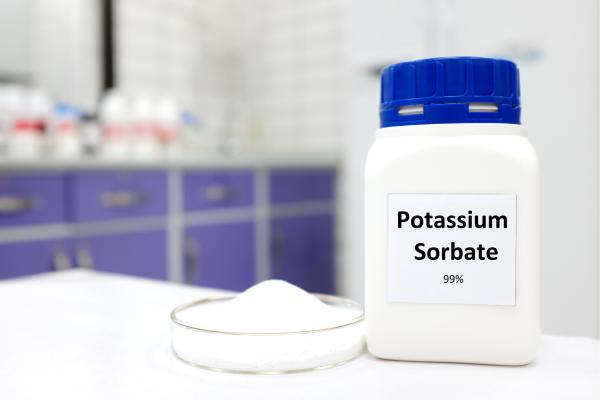Being a brewer for several years now, I’ve always been fascinated by the various additives and preservatives that come into play during the brewing process. One such ingredient that has caught my attention is potassium sorbate.
As a food preservative and wine stabilizer, it’s often used to prevent the growth of mold, yeast, and bacteria in foods and beverages. But, like many other food additives, I often wonder, does potassium sorbate go bad and what is its shelf life?
Potassium sorbate does not go bad in the traditional sense but may lose its effectiveness over time. Its shelf life ranges from 2 to 5 years when stored in a cool, dry place and protected from moisture, air, and light.
To provide you with a better understanding of potassium sorbate, I will dive into its properties, uses, storage conditions, and more.
Let’s explore this versatile ingredient that plays a vital role in preserving the quality of our food and beverages.
What Is Potassium Sorbate?
Potassium sorbate is a white, crystalline powder that is water-soluble and has a slightly sweet taste. Chemically, it is the potassium salt of sorbic acid, a naturally occurring compound found in the berries of the mountain ash tree.

Potassium sorbate is synthetically produced and is recognized as a safe food preservative by the US Food and Drug Administration (FDA).
How is Potassium Sorbate Used In Brewing?
As an experienced brewer with years of firsthand experience, I can attest to the vital role that potassium sorbate plays in the brewing process. Potassium sorbate is a popular preservative used in brewing to inhibit the growth of yeast and molds, ensuring the stability and longevity of the final product.

One of the key challenges faced by brewers is preventing the unwanted fermentation of beer after it has been packaged. This can occur if there are residual yeast or sugars present, leading to overcarbonation, off-flavors, and potential bottle explosions. This is where potassium sorbate comes to the rescue.
After fermentation is complete, and the desired alcohol content and flavor profile have been achieved, brewers typically add potassium sorbate to the beer before bottling or kegging.
This compound is a powerful yeast and mold inhibitor, effectively putting a stop to any remaining yeast activity.
By inhibiting the reproduction of yeast cells, potassium sorbate ensures that the beer remains stable and does not undergo further fermentation, even when exposed to warm temperatures or residual sugars.
The addition of potassium sorbate is a crucial step, especially for beer styles that are intended to be carbonated naturally, such as ciders or certain types of fruit beers.
Without it, the carbonation process would continue in the bottle, resulting in excessive carbonation and potential bottle explosions.
When using potassium sorbate, it is important to follow the recommended dosage guidelines provided by the manufacturer or a trusted brewing resource.
Adding too little potassium sorbate may not effectively inhibit yeast growth, while adding too much can result in off-flavors or a chemical taste in the final product. Careful measurement and adherence to proper brewing techniques are essential.

It is worth noting that while potassium sorbate is highly effective against yeast and molds, it does not have any impact on bacterial growth. Therefore, it should not be relied upon as a substitute for proper cleaning and sanitation practices in the brewing process.
In conclusion, as a seasoned brewer, I can confidently say that potassium sorbate is an indispensable tool for maintaining the stability and quality of brewed beverages. Its ability to inhibit yeast growth and prevent unwanted fermentation ensures that the final product remains consistent and enjoyable for consumers.
By understanding and utilizing potassium sorbate effectively, brewers can achieve the desired flavor, carbonation levels, and longevity in their creations.
Other Uses of Potassium Sorbate
Potassium sorbate is widely used in various industries, including:
Food Industry
Potassium sorbate is a popular food preservative, preventing the growth of mold, yeast, and bacteria. It is commonly used in dairy products, baked goods, canned fruits and vegetables, fruit juices, and condiments, among others.

Sweet Beverage Industry
In the brewing and soda-making process, potassium sorbate is used as a stabilizer to inhibit the growth of spoilage microorganisms and prevent refermentation in soft drinks.
Personal Care Products
Potassium sorbate is also found in cosmetics, personal care products, and pharmaceuticals as a preservative, ensuring their safety and longevity.
Storage Conditions for Potassium Sorbate
Potassium sorbate’s shelf life largely depends on the storage conditions. To maintain its effectiveness, potassium sorbate should be stored in a cool, dry place, away from moisture, air, and light. The ideal storage temperature for potassium sorbate is between 59°F and 77°F (15°C and 25°C).
Factors Affecting Potassium Sorbate’s Shelf Life
Several factors can impact the shelf life of potassium sorbate, including:
Exposure to Moisture
Potassium sorbate is water-soluble, and exposure to moisture can cause it to dissolve, reducing its effectiveness as a preservative. To prevent this, store potassium sorbate in an airtight container.
Exposure to Air
Oxygen can react with potassium sorbate, causing it to degrade over time. To prevent this, ensure that the container is tightly sealed, and minimize the amount of air exposure during use.
Exposure to Light
Prolonged exposure to light may also affect the potency of potassium sorbate. Keep it stored in a dark, cool place or in a container that blocks out light.
Signs That Potassium Sorbate May Have Lost Its Effectiveness
While potassium sorbate does not necessarily “go bad,” it may lose its effectiveness as a preservative over time. Some signs that potassium sorbate may no longer be effective include:
- A change in appearance, such as clumping or discoloration
- A change in odor, indicating possible contamination or degradation
- The product containing potassium sorbate exhibits spoilage, such as mold or off-flavors
If you notice any of these signs, it’s best to replace your potassium sorbate with a fresh supply.
How to Prolong the Shelf Life of Potassium Sorbate
To prolong the shelf life of potassium sorbate, follow these storage guidelines:
- Store potassium sorbate in a cool, dry place away from heat sources and direct sunlight.
- Keep potassium sorbate in an airtight container to prevent exposure to moisture and air.
- Use clean and dry utensils when handling potassium sorbate to avoid introducing contaminants.
Using Potassium Sorbate in Brewing and wine making
In brewing and wine making, potassium sorbate is used to stabilize the product and prevent refermentation. To use potassium sorbate effectively, follow these steps:
1. Dissolve the required amount of potassium sorbate in a small amount of water or wine.
2. Add the dissolved potassium sorbate to the finished product, mixing thoroughly to ensure even distribution.
3. Allow the product to sit for a few days to ensure that the potassium sorbate has effectively inhibited the growth of spoilage microorganisms.

Safety and Precautions When Using Potassium Sorbate
Potassium sorbate is generally recognized as safe by the FDA. However, some individuals may be sensitive to potassium sorbate and experience allergic reactions, such as skin rashes, itching, or swelling. If you suspect you may be allergic to potassium sorbate, avoid using products containing this ingredient and consult a medical professional.
Alternatives to Potassium Sorbate
If you are looking for alternatives to potassium sorbate, consider the following options:
- Sodium benzoate: Another widely used food preservative, effective against yeast and bacteria.
- Calcium propionate: Commonly used in bread and other baked goods to prevent mold growth.
- Natamycin: A natural mold inhibitor used in cheese and other dairy products.
- Potassium metabisulfite: Also known among brewers as “campden”, essentially sulfite that inhibits microorganisms and prevents oxidation.
Conclusion
Potassium sorbate does not go bad in the traditional sense, but it may lose its effectiveness over time. Its shelf life ranges from 2 to 5 years when stored in a cool, dry place and protected from moisture, air, and light.
To ensure the best results, always store potassium sorbate properly and replace it once it has reached the end of its shelf life. Here are 10 key facts about potassium sorbate to remember:
1. Potassium sorbate is a food preservative and wine stabilizer.
2. Chemically, it is the potassium salt of sorbic acid.
3. It is recognized as a safe food preservative by the FDA.
4. Potassium sorbate is used in the food, beverage, and personal care industries.
5. Its shelf life ranges from 2 to 5 years.
6. Proper storage conditions include a cool, dry place away from moisture, air, and light.
7. Factors affecting its shelf life include exposure to moisture, air, and light.
8. Signs of reduced effectiveness include changes in appearance or odor, or spoilage in the product containing potassium sorbate.
9. Potassium sorbate is used in brewing and wine making to prevent refermentation and spoilage.
10. Alternatives to potassium sorbate include sodium benzoate, calcium propionate, and natamycin.
FAQs
Is potassium sorbate a healthy preservative?
Potassium sorbate is generally considered safe for human consumption and is approved for use as a preservative in many countries. However, like any food additive, it should be consumed in moderation and according to the recommended guidelines.
Where is potassium sorbate banned?
Potassium sorbate is not banned in any country, but its usage is regulated and limited in certain food products in some countries.
Is potassium sorbate inflammatory?
No, potassium sorbate is not inflammatory. In fact, it has been shown to have anti-inflammatory properties in some studies. However, it is important to note that some individuals may have an allergic reaction to potassium sorbate, which could cause inflammation.
How much potassium sorbate is safe in food?
The safe level of potassium sorbate in food is determined by regulatory agencies such as the FDA and varies depending on the specific food product. Generally, it is considered safe at levels up to 0.1% of the total weight of the food.
Can potassium sorbate expire?
Yes, potassium sorbate can expire. Its shelf life depends on various factors such as storage conditions, packaging, and exposure to light, heat, and moisture. It is recommended to use potassium sorbate within two years from the date of manufacture to ensure its effectiveness.
What is the disadvantage of potassium sorbate?
One disadvantage of potassium sorbate is that it may not be effective against certain types of microorganisms, such as molds and yeasts.




